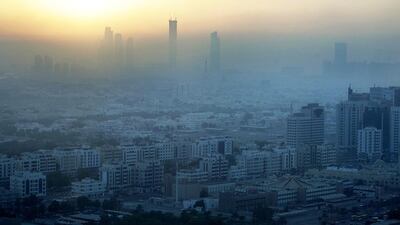The IMF’s prediction of a 2.3 per cent fiscal deficit for the UAE this year is much lower than what many private-sector forecasters had been expecting.
A shortfall in the Government’s budget, its first since 2009, has been widely expected since oil prices slumped at the end of last year. Global oil prices averaged about US$100 a barrel last year, but this year they have been averaging about $60 a barrel.
The IMF economist Zeine Zeidane is forecasting a consolidated fiscal deficit of 2.3 per cent of the UAE’s GDP this year, compared to a 5 per cent surplus last year.
The IMF will release a full report on the UAE's economy next month. Mr Zeidane said he was expecting inflation to rise this year because of higher rents despite easing home prices in Dubai. The UAE's non-hydrocarbons (oil and gas) economy would grow 3.4 per cent, while inflation would increase 3.8 per cent this year, he said.
The IMF expects overall economic growth of 3 per cent this year, down from 4.6 per cent last year. But the fund praised the Government’s policies and continued spending on major infrastructure projects for blunting the impact of lower oil prices on economic growth.
The IMF’s detailed reports on the UAE are closely watched because the Government chooses to release detailed estimates of its spending plans through the fund, said Mathias Angonin, an analyst in the Moody’s sovereign risk group in Dubai.
Several private-sector economic forecasters had been projecting higher budget deficits than the IMF.
Although the IMF has privileged access to the Government’s spending plans, its overall deficit prediction is not necessarily more accurate than private forecasters because it avoids forecasting oil prices. Instead, it simply factors in prices of oil futures.
Monica Malik, Abu Dhabi Commercial Bank’s chief economist, has been forecasting a 4 per cent fiscal shortfall for this year, a modest deficit compared with the UAE government’s vast financial resources.
“Thanks to the reforms over the last two years, the impact of the fall in house prices in Dubai on the overall economy should be contained,” she said. The measures taken to avoid boom-and-bust in the real estate sector, which had such a negative impact during the financial crisis six years ago, meant “that non-oil GDP growth should remain respectable”, said Ms Malik.
Also, the Government’s medium-term investment programme would support the economy, she said. It focuses on transportation projects, housing projects in Abu Dhabi, new leisure parks for tourism in Dubai, healthcare and education. Abu Dhabi is also maintaining spending on energy projects, including those designed to meet domestic needs.
The IMF praised the UAE’s efforts but still made some recommendations for reform. It said the Government “should preserve investment spending, control the public wage bill, phase out subsidies while strengthening safety nets, reduce transfers to government-related entities and mobilise more non-hydrocarbon revenues”.
Many of those reform measures are being enacted, although the IMF echoes calls from the financial community for more transparency from the Government, particularly on government-related entities and their debt loads.
The pace of spending and reform depends to a large degree on oil prices and whether they stabilise or remain volatile, said Sebastien Henin, the head of asset management at The National Investor, an investment company in Abu Dhabi.
"In the past, the government had been very pragmatic and cut spending each time there was a fall in oil prices," he said. "It hasn't done so this time, but it's not clear yet whether that is because of a change in policies or because it expects oil prices to recover."
As things stand, the Government has plenty of financial flexibility to weather lower oil prices and fund minor fiscal deficits. But if oil prices do not recover, then “they will have to make some calls and implement some long-term solutions”, Mr Henin said.
The IMF’s view mirrors that and it will provide more details on the UAE’s spending in its full report next month.
amcauley@thenational.ae
Follow The National's Business section on Twitter

